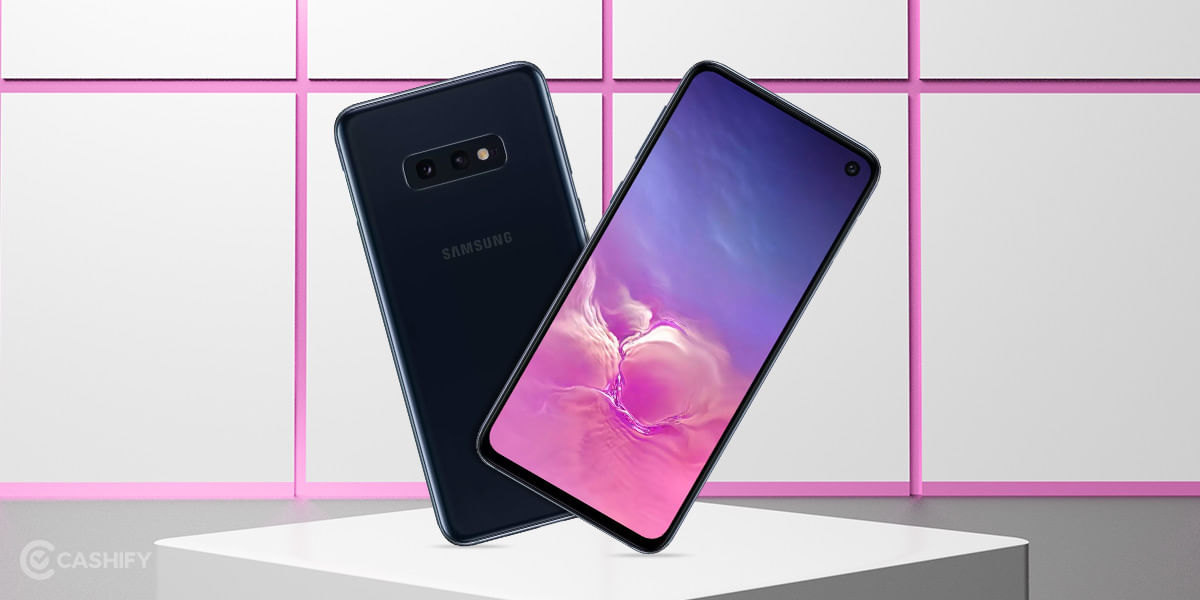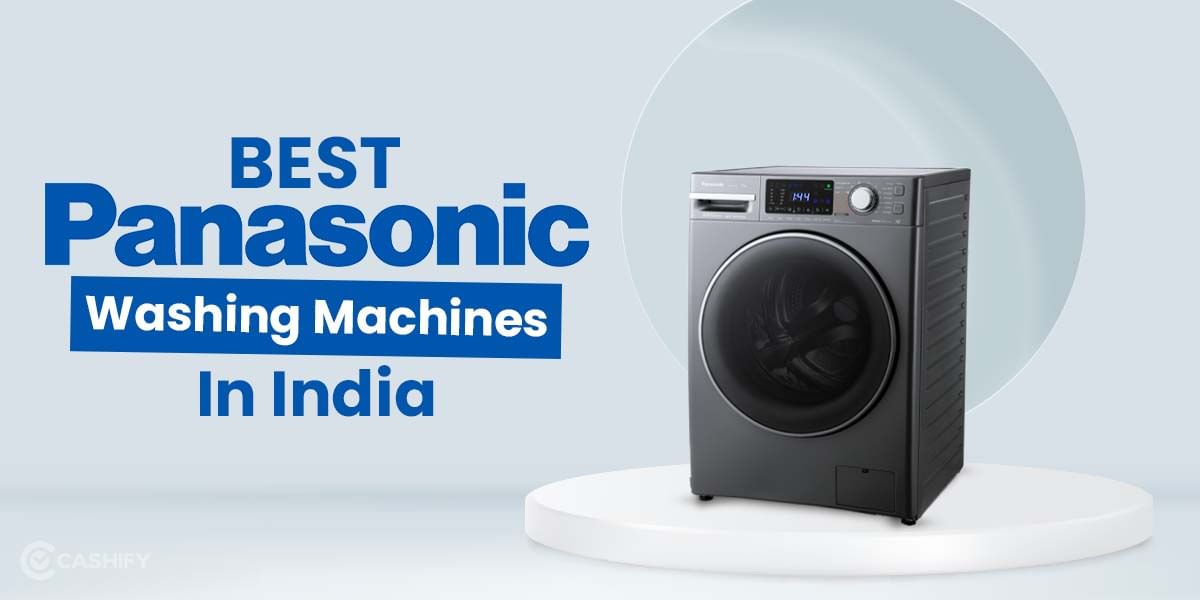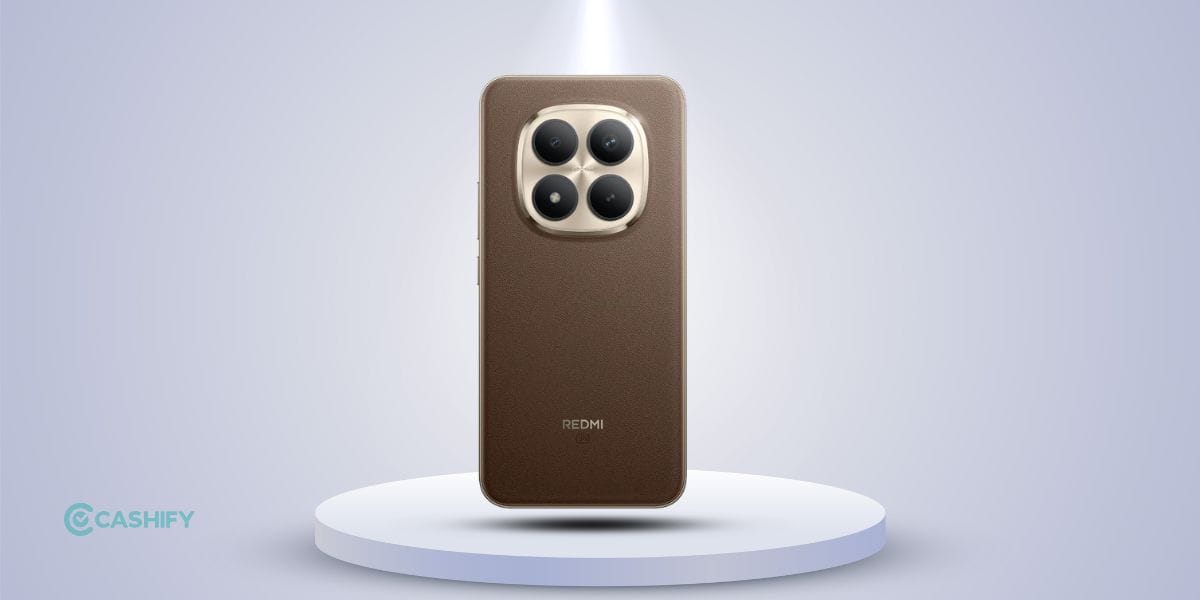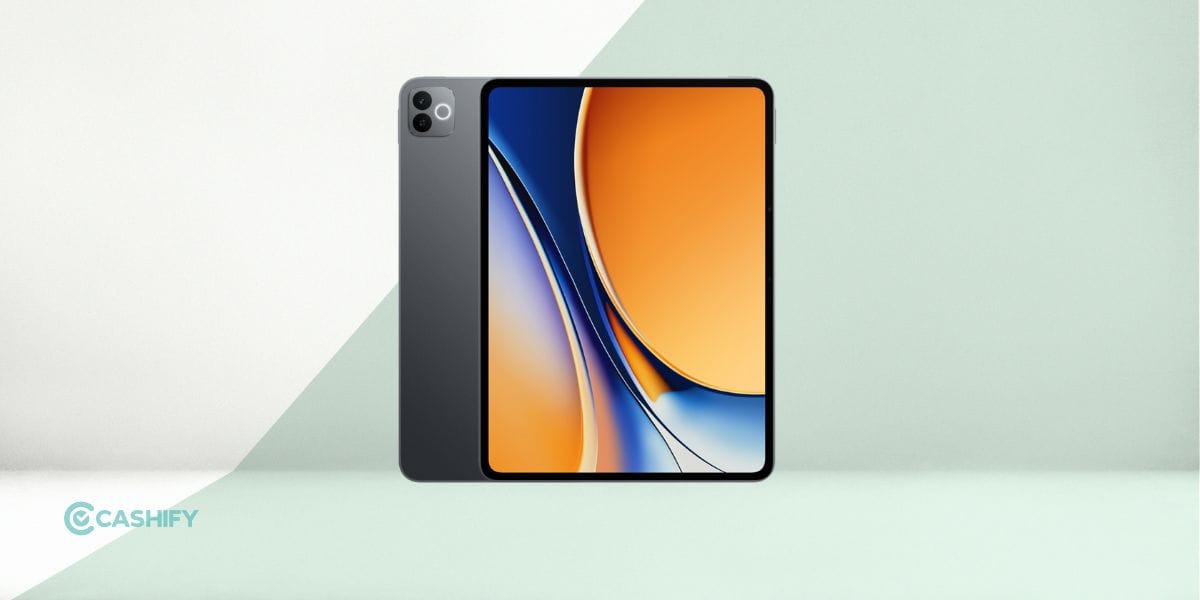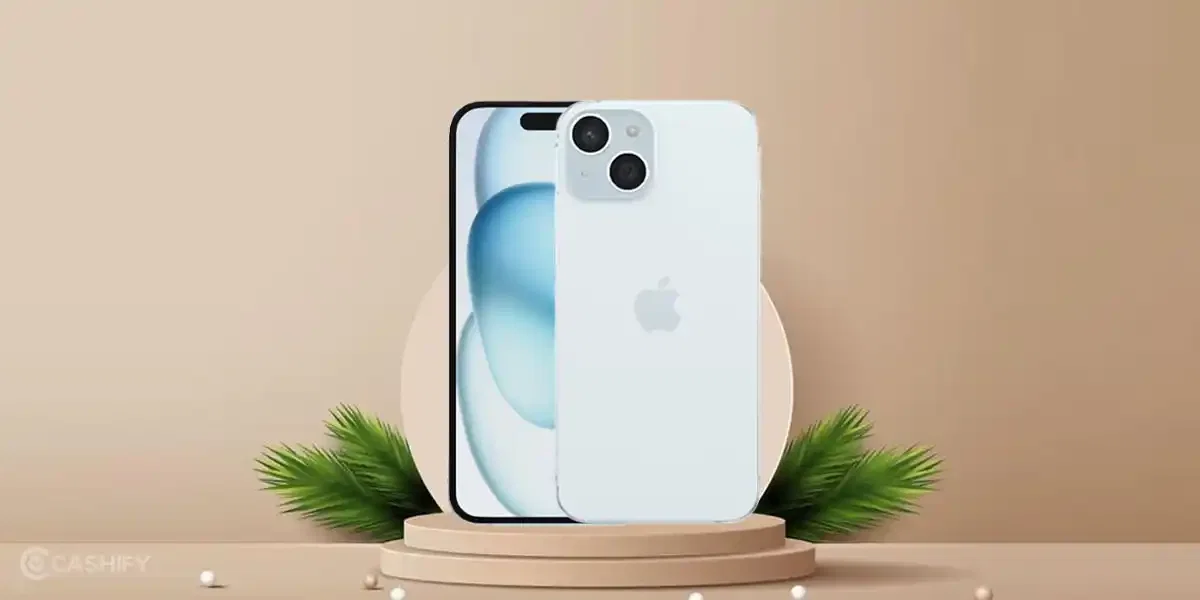Introduction
Samsung recently launched the fourth smartphone in its budget Galaxy M lineup, dubbed Galaxy M40. The Galaxy M40 is the company’s most powerful budget smartphone as of now in the Indian market. For those who’re unaware, Samsung has introduced various M-series devices with aggressive pricing in order to compete with the growing dominance of Xiaomi and other Chinese smartphone makers.
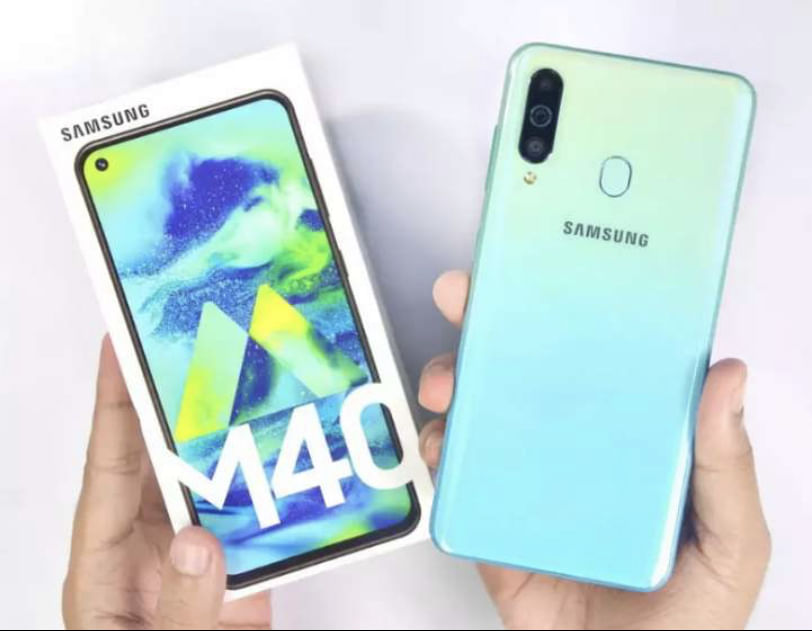
Coming back to the device, the Galaxy M40 is known for its Infinity-O display that is similar to the one found on the company’s flagship Galaxy S10. Another key feature of the smartphone is the powerful Snapdragon 675 chipset. The device also sports a triple-rear camera set-up at the back. With Galaxy M40, Samsung tries to attract users on the basis of its new display that no other manufacturer at this price range offers.
We’ve been testing this device out for more than a week now and here is what we think of it. Read on to find out more about the Galaxy M40 in our detailed and comprehensive review.
Price in India, Variants, and Availability
Samsung Galaxy M40 comes in a single storage variant featuring 6GB of RAM and 128GB of internal storage. In terms of color, the device comes in two options, namely Midnight Blue and Seawater Blue. The Galaxy M40 is available for purchase on both Amazon India and Samsung Store for a price tag of INR 19,990.
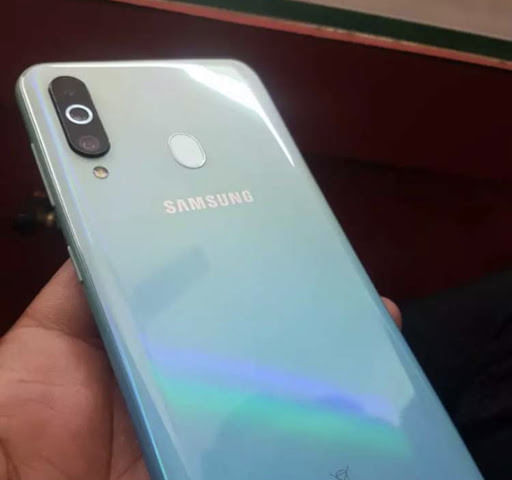
At the time of writing this review, Samsung is giving offers in partnership with various telecom companies. Jio is offering double data offer while Airtel is giving 100% more data. Vodafone, on the other hand, is giving cashback offer in the form of small recharge coupons. The buyers can also avail No Cost EMI using any major credit and debit cards.
Box Contents
Samsung Galaxy M40 comes packed in a white-colored box with the device’s photo covering the entire front view. The very first that you’ll be greeted with once you open the box is the device itself covered in a plastic protective wrap.
Underneath it, there is a rectangular section that consists of a SIM ejector tool and some reading materials. There is a 15W fast charger adapter and a USB Type-C cable at the bottom of the box. Since the device has no 3.5-mm headphone jack, Samsung has thrown in Type-C earphones with the pretty decent build quality.
Here is a quick overview of what you’ll be getting inside the box:
– Samsung Galaxy M40 handset
– 15W fast charger adapter
– USB Type-C cable
– SIM ejector tool
– Type-C earphones
– Reading manuals
Specs at a Glance
Before we jump right into our comprehensive review, let’s have a look at what the device brings to the table.
– Display: 6.3-inch PLS panel, 1080×2340 pixels
– Processor: Snapdragon 675, 11nm
– RAM & ROM: 6GB and 128GB
– Rear camera: 32MP+8MP+5MP
– Selfie camera: 16MP, f/2.0
– Battery: 3,500mAh capacity, 15W fast charge support
– Software: Android Pie, OneUI
– Weight: 168g
– Dimensions: 155.3×73.9×7.9mm
– Price: INR 19,990
With key specifications out of the way, let’s talk about the design and build of the device in detail.
Design and Build Quality
Samsung Galaxy M40 is a beautiful looking device and is made up of polycarbonate body. The design is somewhat similar to that of its predecessor, Galaxy M30. In fact, you would not be able to differentiate between them to some distance. Looking closely, you’ll start to notice some key differences.
For one, the device has a gradient pattern on the back with the curved edges having a different shade of Blue while the remaining part uses a darker shade of Blue.
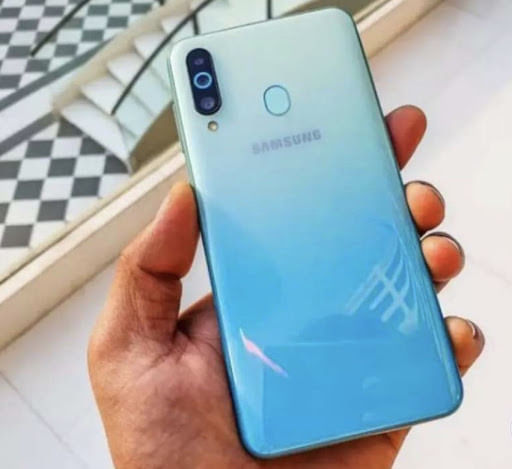
The corners and the company’s logo on the back reflect like a Rainbow, which looks brilliant. We would say that it is one of the good looking smartphones in this price range. Thanks to the curved edges, the smartphone is very comfortable to hold which only enhances the overall user experience.
As expected, the back is a fingerprint magnet but that is not a big deal-breaker for us. You will find a vertically-aligned triple camera at the back along with the fingerprint sensor. There is a unique chromatic ring that circles around the rear cameras.
On the front, the smartphone sports a big display with a punch-hole camera cutout. Surprisingly, the smartphone still comes with top-notch thick side bezels and chin. We still don’t understand why the phone has bezels if it uses the punch-hole display. The chin is still thinner than the previous M series devices so that’s a good thing.
At the bottom, there is a speaker grille and a USB Type-C charging port. Sadly, there is no 3.5-mm headphone jack on this phone. In fact, the phone should have a thinner chin if there is no audio jack but the opposite is the case here.
The phone also makes use of Screen Sound Cast Technology, which uses the vibration in the display to produce audio output. We’ll talk more about this feature further in this review.
Overall, the Galaxy M40 is a comfortable, lightweight and the good-looking smartphones in this price range. Samsung tried to do something different with the design by introducing a few small changes that we really liked.
Display
Samsung Galaxy M40 boasts a big 6.3-inch PLS TFT display that somehow delivers impressive experience. For those who’re unaware, PLS TFT offers similar color accuracy and sharpness to IPS LCD panels. With FHD+ resolution having 1080×2349 pixels, the display offers pretty decent sharpness levels and viewing angles.
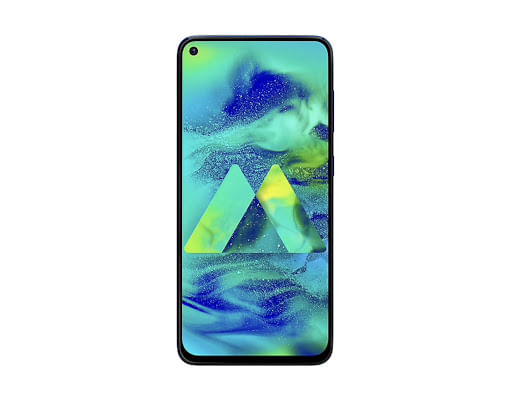
Thanks to the punch-hole cutout, Samsung is able to offer a screen-to-body-ratio of 90 percent. Of course, the colors and deepness of black are not as impressive as that of an AMOLED display. Still, Galaxy M40 offers an impressive experience and you would love watching movies on this phone. Sunlight legibility is also up to the mark on the device.
The Galaxy M40 comes with the Widevine L1 certification that means you can stream HD content from the popular streaming services like Netflix and Prime Video on your phone. This is something which various Chinese manufacturers do not include.
Performance
Under the hood, Samsung Galaxy M40 is powered by a Qualcomm Snapdragon 675 chipset coupled with 6GB of RAM and 128GB of internal memory. The Snapdragon 675 is fabricated using an 11nm manufacturing process having eight cores – 2x Kryo 460 Gold clocked at 2.0GHz and 6x Kryo 460 Silver clocked at 1.7GHz.
Under the price tag of 20k, the Snapdragon 675 is the popular chipset that, in fact, is also present in the Redmi Note 7 Pro. The processor is pretty capable and can handle all the moderate tasks with perfection. Coming to heavy usage, the device will give you a respectable performance.
With 6GB of RAM, the multitasking experience is pretty impressive. Applications stay in memory for a longer period of time and switching between them is a very rapid experience. The processor lags behind when it comes to heavy multitasking and graphics-demanding games.
We tried playing PUBG Mobile on Samsung Galaxy M40, which by the way runs on the medium setting by default. Again, you will get a respectable graphics-intensive gaming performance from this device.
For a regular usage who largely switches between apps and might do casual gaming, then Galaxy M40 is a solid performer in our opinion.
Software
One thing that gives an edge to the Galaxy M40 over the other devices in this price range is the software. Samsung Galaxy M40 runs on the latest version of Android, i.e. Android 9.0 Pie, based on the company’s latest One UI software.
This is the first M-series device to come with the all-new OneUI software out of the box. The new software of the company shows that the brand is on its right path. The UI focuses on clean, minimal and one-handed usage which is something we really need, considering the growing size of the devices, nowadays.
There are tons of customizations and features spread across the UI, most of which you’ll definitely appreciate. The phone has all the Android Pie features like gesture navigation, digital wellbeing, night mode, and adaptive battery. On top of this, Samsung has included tons of useful features and customizations of its own.
In this price range, Xiaomi offers ad-filled MIUI, Asus offers its somewhat stock experience, and Realme offers ColorOS that still needs to be matured in various ways. In my daily usage, we never had any complaint with the One UI software.
We can say, without any hesitation, that One UI is one of the best software and the fact that Samsung introduced it in a budget device is appreciated.
Cameras
Moving on to the optics, Samsung Galaxy M40 is equipped with a triple camera module having a 32MP primary sensor (f/1.7 aperture), an 8MP ultrawide lens with 123-degree FoV, and 5MP depth-sensing camera. For selfies, there is a single 16MP front snapper drilled in the punch-hole cutout.
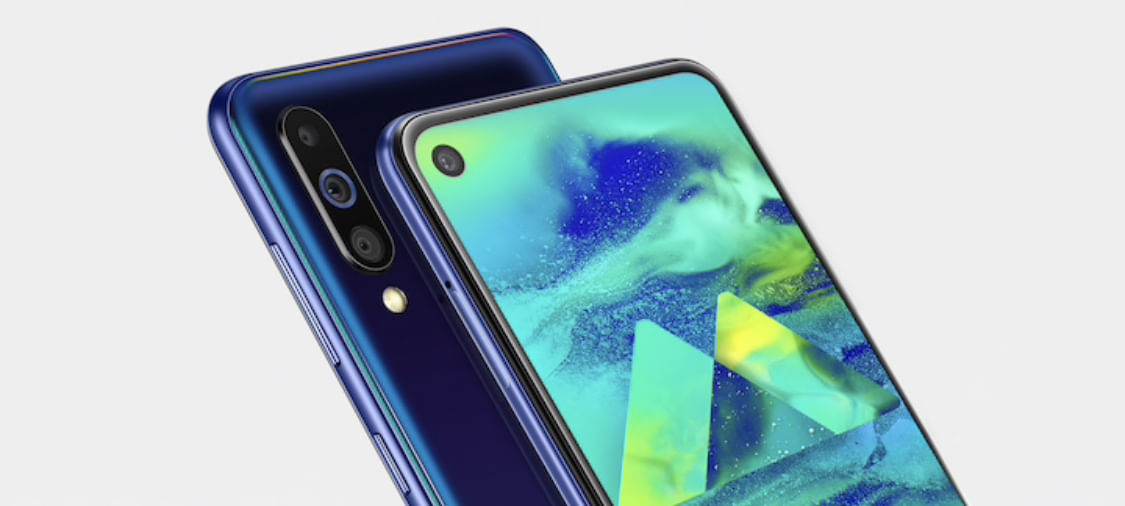
The main 32MP camera sensor clicks decent shots with a good level of details, sharpness, and color accuracy. In bright light conditions, the pictures coming out of this sensor will definitely impress you. On the contrary, the low-light camera performance is something, which the main camera sucks big time.
The Galaxy M40 churns out some of the best portrait shots at this price point. The edge detection is very accurate, which is something that other competitors fail to offer. There is an ultra-wide-angle lens that can click shot with a much bigger view. Although the performance of the lens is not that impressive, it is still respectable.
The device makes use of AI scene detection, which seems to work pretty well and controls the camera settings depending on the scene. The feature changes various settings like exposure, ISO and dynamic range on its own in order to deliver the best photos. Also, the camera application has all the possible features, modes, and the UI is very simple & easy to use.
Selfies are something in which the device needs a ton of improvements. The Galaxy M40’s front camera suffers from unnecessary beatification problem. Even though the beauty mode is turned off, the software still smoothens and whitens the skin, making it look a bit artificial. We like selfies to look real, which is something M40 was not able to.
We believe Samsung might try to fix this issue in a software update but the brand does have a track of slow updates.
Battery Life
The Galaxy M40 is fueled by a decent 3500mAh battery cell, which also supports a 15W fast charging feature. The battery life is more than enough to get you throughout the day on a single charge.
To test out the battery, we tried using this device extensively. The regular usage looks something like this – WiFi and Bluetooth always on and connected, Brightness at around 50%, constant text messaging, maximum music playback, a couple of hours of PUBG Mobile, and finally 2 or 3 hours of YouTube or Netflix streaming. With all tasks, the device was able to last till the night, which is very impressive.
It takes 90 minutes or so to charge from zero to 100%; thanks to the 15W fast charging support.
Audio, Biometrics, and Connectivity
For audio, the smartphone uses a mono speaker at the bottom, which is very loud and can give you a decent experience. If you like to stream Netflix on speaker output, then the device will not disappoint you.
As mentioned earlier, there is no 3.5-mm headphone jack, which might be a deal breaker for many buyers out there. To make up for it, Samsung decided to throw in free Type-C earphones with the decent build quality.
When it comes to the calling, the phone has no earpiece; instead, it uses Screen Sound Cast Technology. This tech makes use of the vibrations inside the display and converts it into an audio form. So far, we haven’t faced even a single issue in this.
The audio quality is pretty nice and we were able to hear everything clearly. In fact, the audio level is not that loud unlike other phones with similar tech.
There is a fingerprint sensor at the back which again unlocks your phone in a jiffy. The sensor is fairly fast, accurate, and much reliable. You can also make use of Face Unlock, which is also a very quick unlock option but that isn’t secure. Also, it sometimes doesn’t even work in low-light conditions.
In terms of connectivity, the smartphone comes packed with all the standard features. It has dual-band WiFi, Bluetooth 5.0, GPS, and USB Type-C port for charging. On top of this, the device also comes with NFC for mobile payments and one-tap pairing requests.
Pros and Cons
Pros
– Beautiful design
– Impressive display with a punch-hole camera cut out
– Longer battery life
– Screen Sound Cast technology
– One UI software
Cons
– Poor low-light camera performance
– Selfies turn out to be over beautified
– No headphone jack
Galaxy M40 is a powerful smartphone in Samsung’s M-series lineup. In fact, it is an all-rounder device in our opinion. The design is something new, which you’ll definitely love; performance is also at par with no noticeable lags or stutters and battery life is definitely impressive.
The device also comes with a slew of attractive features like punch-hole display, triple rear cameras, and Screen Sound Cast tech. All these features come in a budget price tag, which is quite appealing. The front cameras and low-light camera performance is something, which is a disappointment.
When it comes to choosing between Redmi Note 7 Pro and Galaxy M40, we would incline a bit more towards the latter. The only downside of choosing M40 is the cameras and that too in low-light conditions. Plus, you will get the One UI software that is very impressive, to be honest.
Now, Samsung Galaxy M40 competes with Galaxy A50 since both of them come with the exact same pricing. Galaxy A50 has much better cameras, an AMOLED panel, Always-On display and sadly, a slower under display fingerprint sensor.
If cameras are your top priority, then you should go for Galaxy A50 and with that, you’ll also get the best display panel. If you’re looking for features to impress, then you can go for Galaxy M40.

